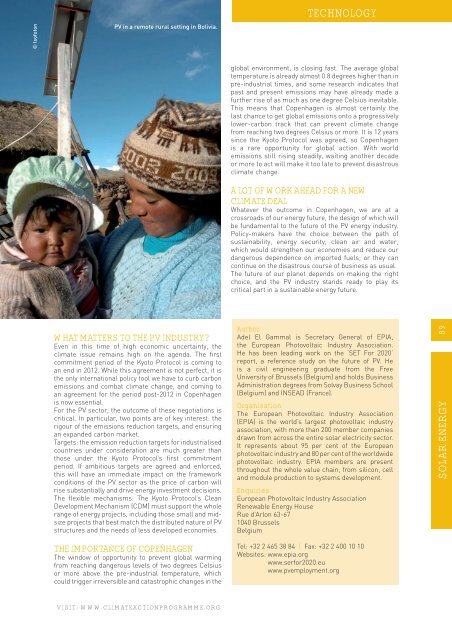Climate Action 2009-2010
Create successful ePaper yourself
Turn your PDF publications into a flip-book with our unique Google optimized e-Paper software.
© Isofoton<br />
PV in a remote rural setting in Bolivia.<br />
TECHNOLOGY<br />
global environment, is closing fast. The average global<br />
temperature is already almost 0.8 degrees higher than in<br />
pre-industrial times, and some research indicates that<br />
past and present emissions may have already made a<br />
further rise of as much as one degree Celsius inevitable.<br />
This means that Copenhagen is almost certainly the<br />
last chance to get global emissions onto a progressively<br />
lower-carbon track that can prevent climate change<br />
from reaching two degrees Celsius or more. It is 12 years<br />
since the Kyoto Protocol was agreed, so Copenhagen<br />
is a rare opportunity for global action. With world<br />
emissions still rising steadily, waiting another decade<br />
or more to act will make it too late to prevent disastrous<br />
climate change.<br />
A LOT OF WORK AHEAD FOR A NEW<br />
CLIMATE DEAL<br />
Whatever the outcome in Copenhagen, we are at a<br />
crossroads of our energy future, the design of which will<br />
be fundamental to the future of the PV energy industry.<br />
Policy-makers have the choice between the path of<br />
sustainability, energy security, clean air and water,<br />
which would strengthen our economies and reduce our<br />
dangerous dependence on imported fuels; or they can<br />
continue on the disastrous course of business as usual.<br />
The future of our planet depends on making the right<br />
choice, and the PV industry stands ready to play its<br />
critical part in a sustainable energy future.<br />
WHAT MATTERS TO THE PV INDUSTRY?<br />
Even in this time of high economic uncertainty, the<br />
climate issue remains high on the agenda. The first<br />
commitment period of the Kyoto Protocol is coming to<br />
an end in 2012. While this agreement is not perfect, it is<br />
the only international policy tool we have to curb carbon<br />
emissions and combat climate change, and coming to<br />
an agreement for the period post-2012 in Copenhagen<br />
is now essential.<br />
For the PV sector, the outcome of these negotiations is<br />
critical. In particular, two points are of key interest: the<br />
rigour of the emissions reduction targets, and ensuring<br />
an expanded carbon market.<br />
Targets: the emission reduction targets for industrialised<br />
countries under consideration are much greater than<br />
those under the Kyoto Protocol’s first commitment<br />
period. If ambitious targets are agreed and enforced,<br />
this will have an immediate impact on the framework<br />
conditions of the PV sector as the price of carbon will<br />
rise substantially and drive energy investment decisions.<br />
The flexible mechanisms: The Kyoto Protocol’s Clean<br />
Development Mechanism (CDM) must support the whole<br />
range of energy projects, including those small and midsize<br />
projects that best match the distributed nature of PV<br />
structures and the needs of less developed economies.<br />
Author<br />
Adel El Gammal is Secretary General of EPIA,<br />
the European Photovoltaic Industry Association.<br />
He has been leading work on the ‘SET For 2020’<br />
report, a reference study on the future of PV. He<br />
is a civil engineering graduate from the Free<br />
University of Brussels (Belgium) and holds Business<br />
Administration degrees from Solvay Business School<br />
(Belgium) and INSEAD (France).<br />
Organisation<br />
The European Photovoltaic Industry Association<br />
(EPIA) is the world’s largest photovoltaic industry<br />
association, with more than 200 member companies<br />
drawn from across the entire solar electricity sector.<br />
It represents about 95 per cent of the European<br />
photovoltaic industry and 80 per cent of the worldwide<br />
photovoltaic industry. EPIA members are present<br />
throughout the whole value chain, from silicon, cell<br />
and module production to systems development.<br />
Enquiries<br />
European Photovoltaic Industry Association<br />
Renewable Energy House<br />
Rue d’Arlon 63-67<br />
1040 Brussels<br />
Belgium<br />
SOLAR ENERGY 89<br />
THE IMPORTANCE OF COPENHAGEN<br />
The window of opportunity to prevent global warming<br />
from reaching dangerous levels of two degrees Celsius<br />
or more above the pre-industrial temperature, which<br />
could trigger irreversible and catastrophic changes in the<br />
Tel: +32 2 465 38 84 | Fax: +32 2 400 10 10<br />
Websites: www.epia.org<br />
www.serfor2020.eu<br />
www.pvemployment.org<br />
VISIT: WWW.CLIMATEACTIONPROGRAMME.ORG












